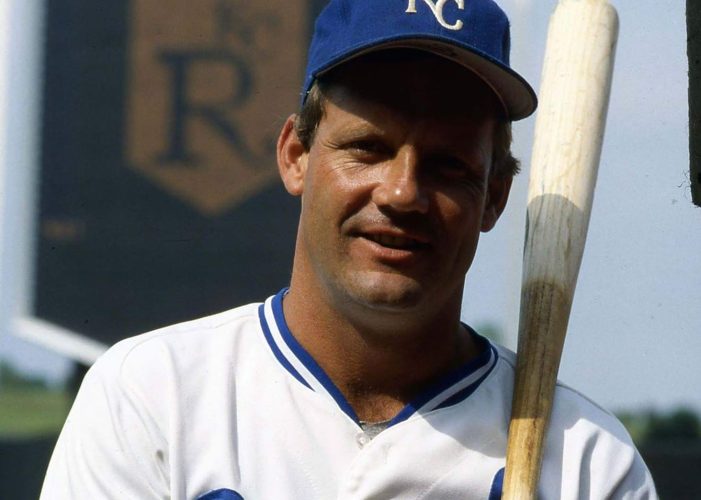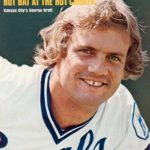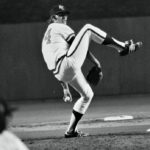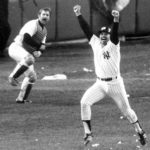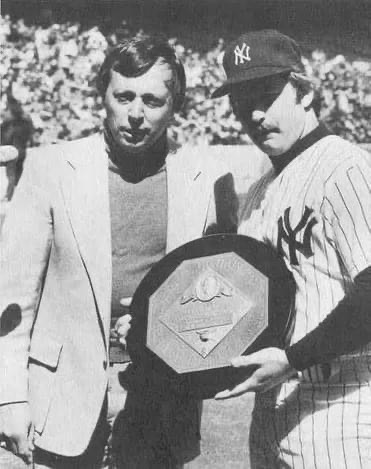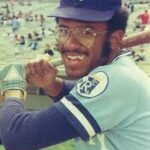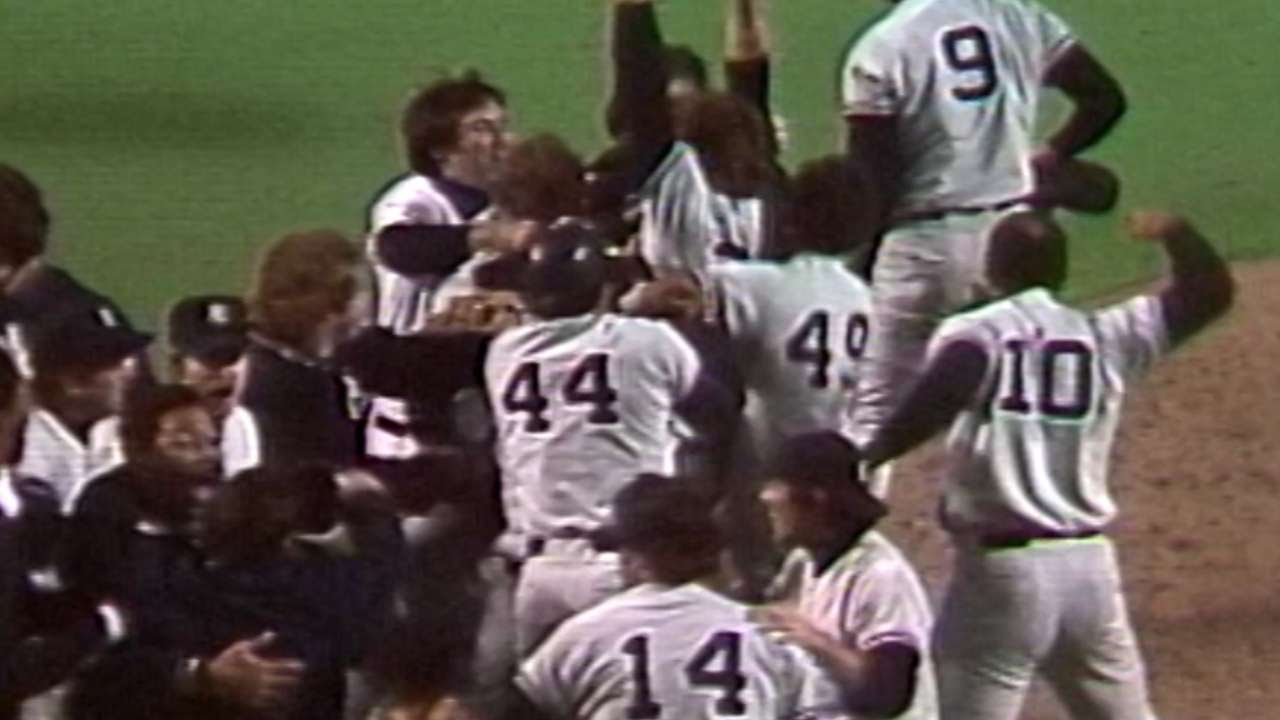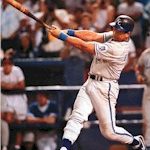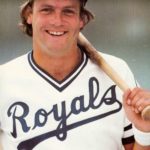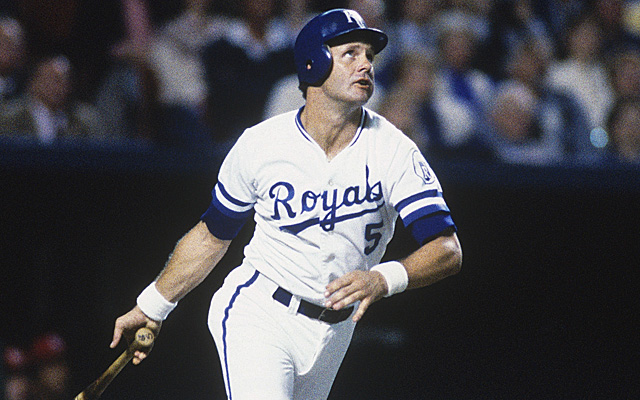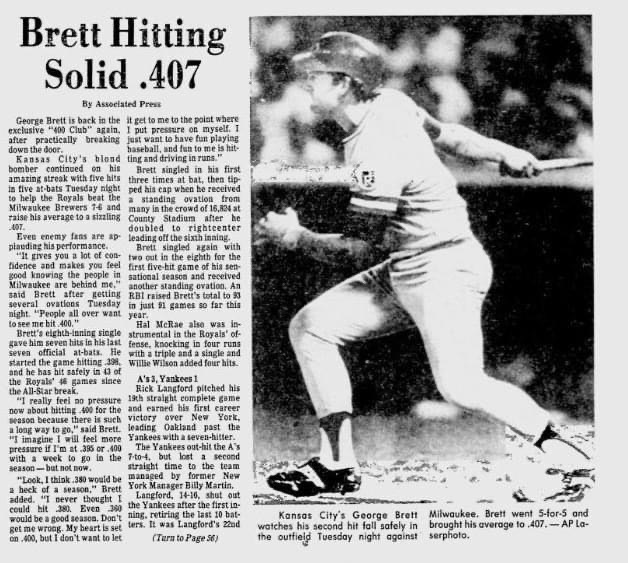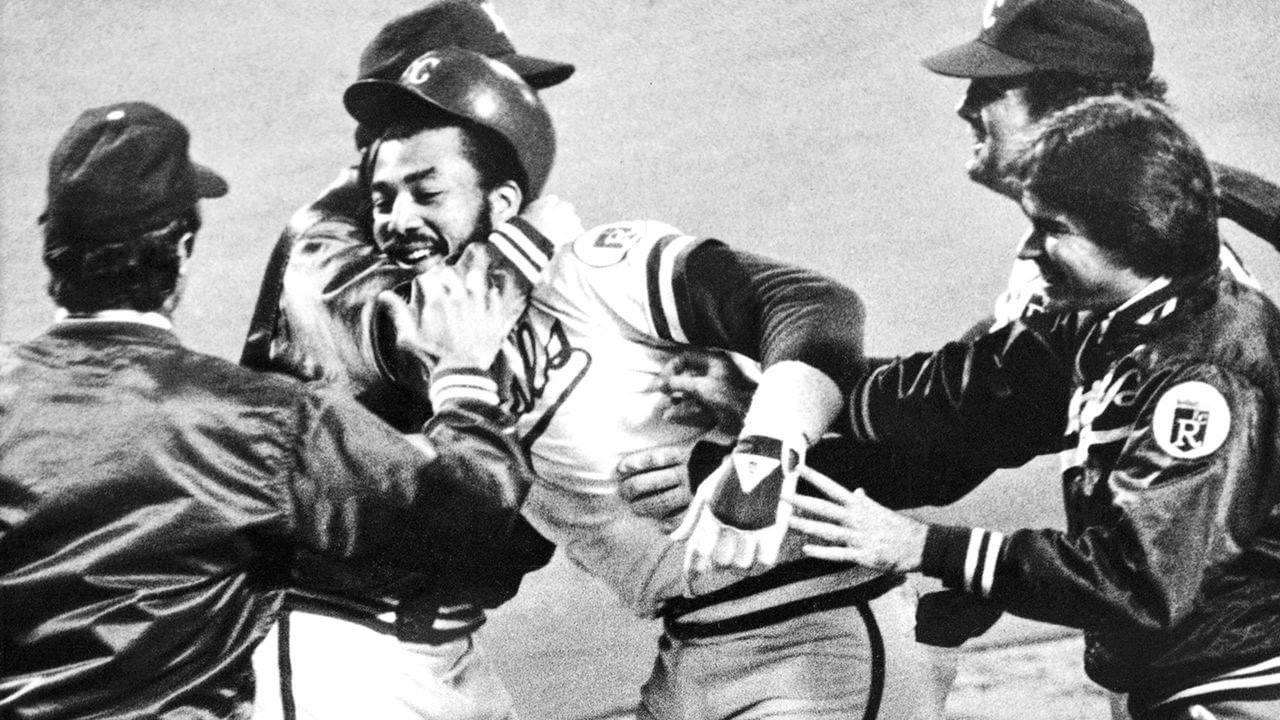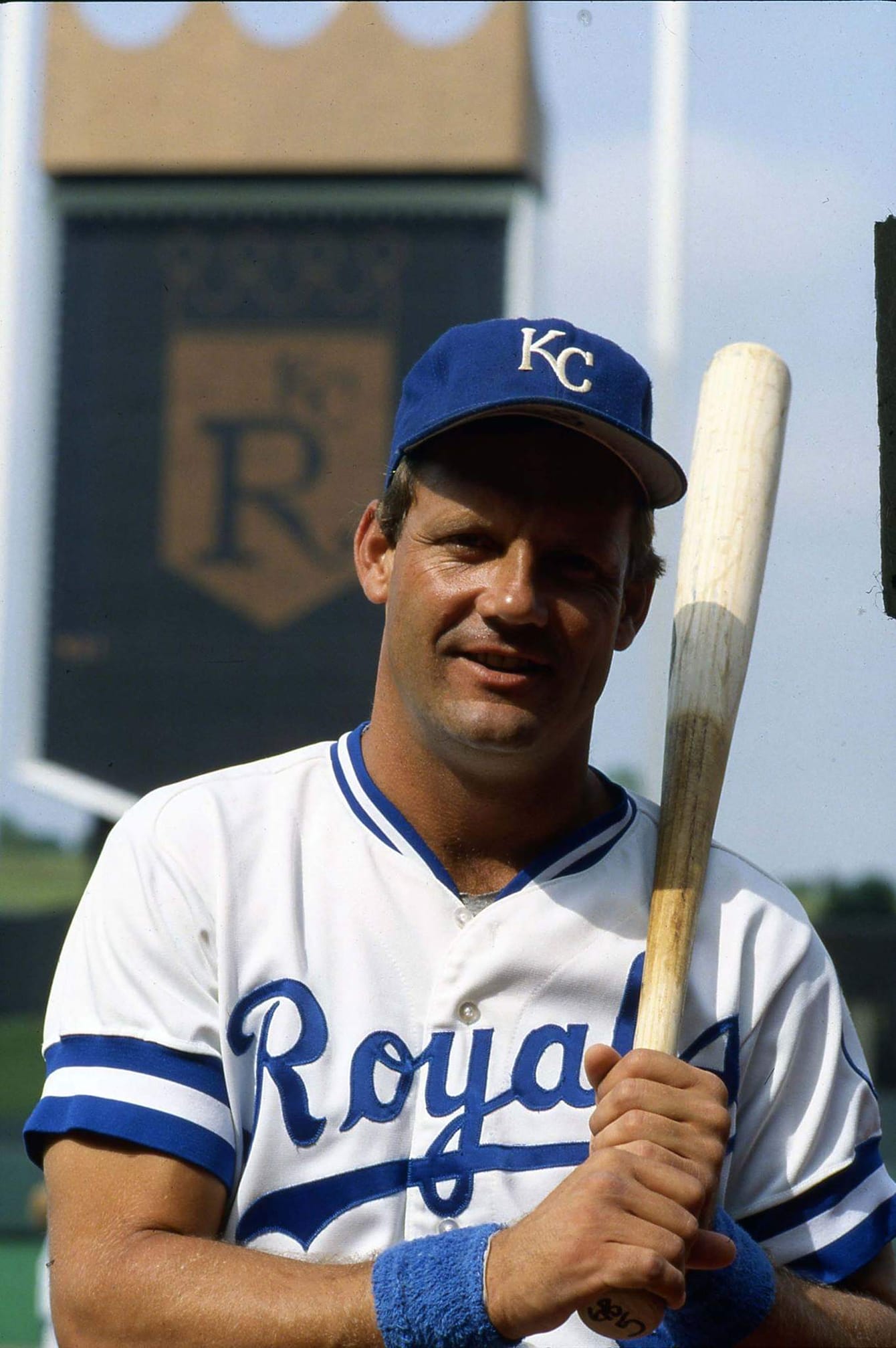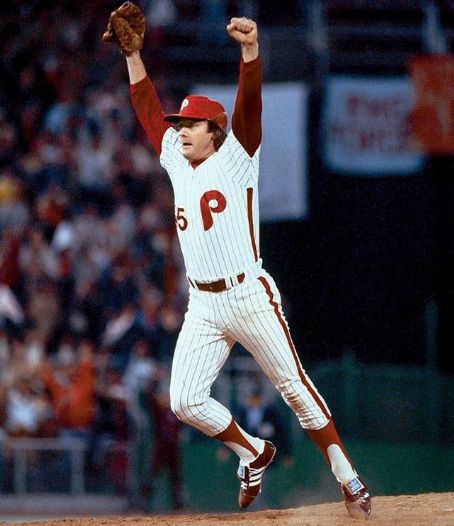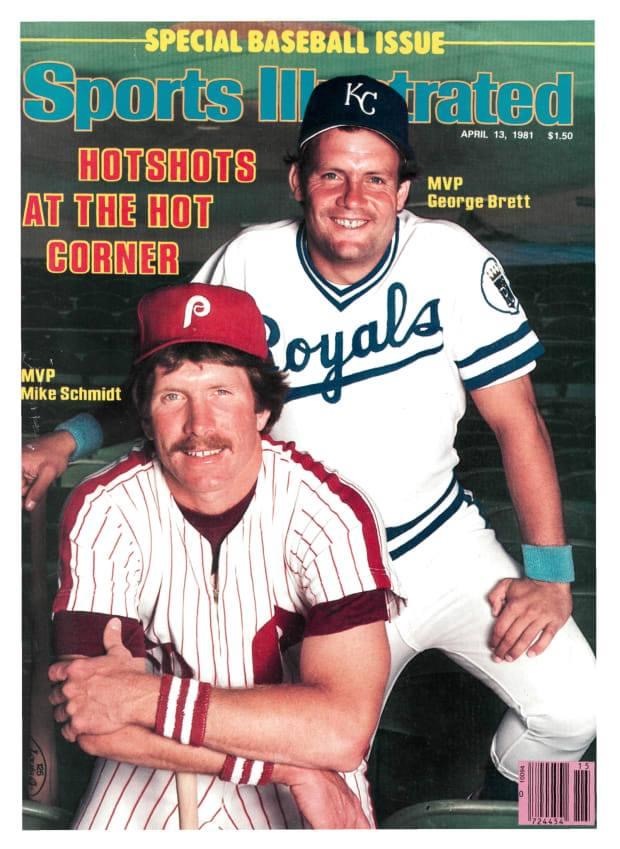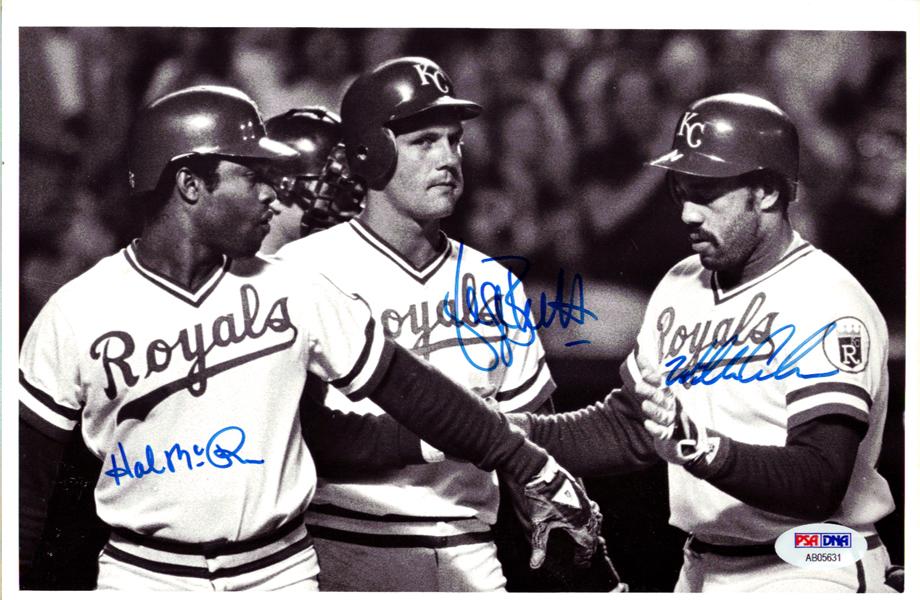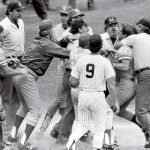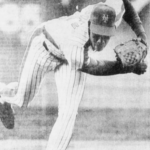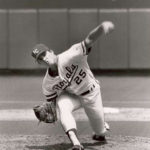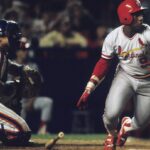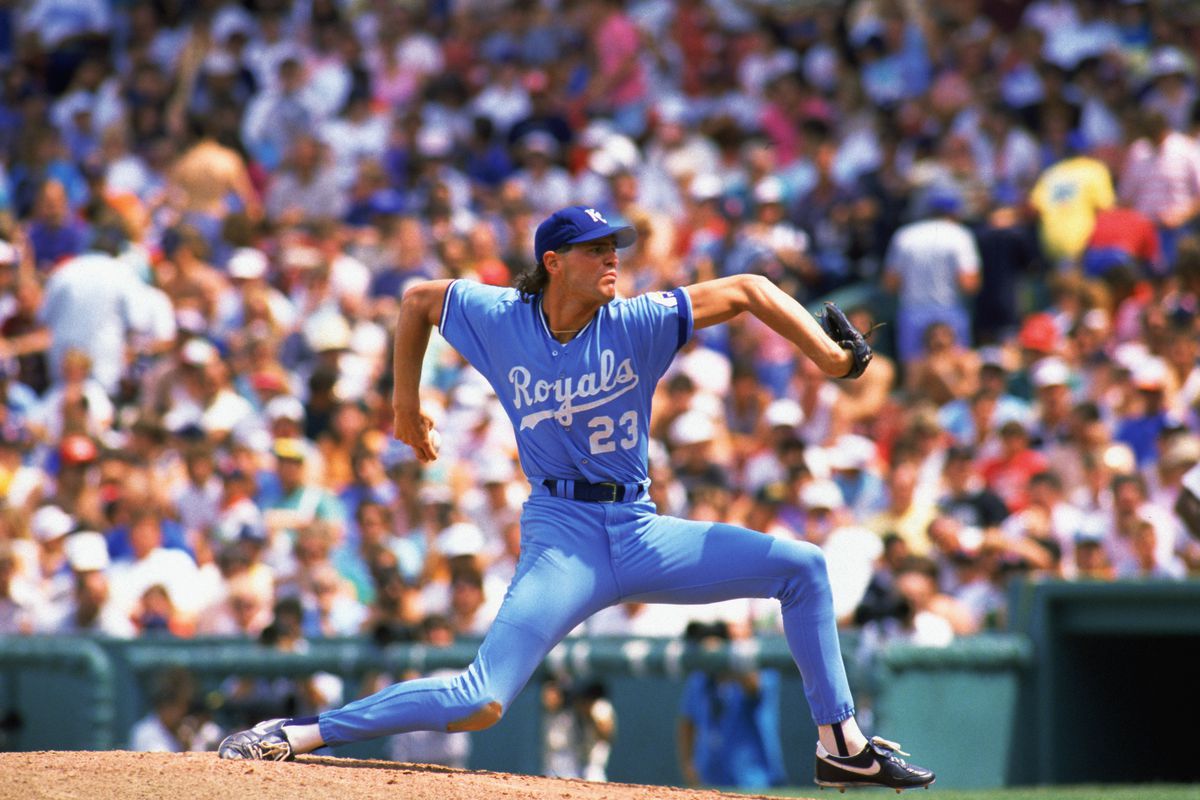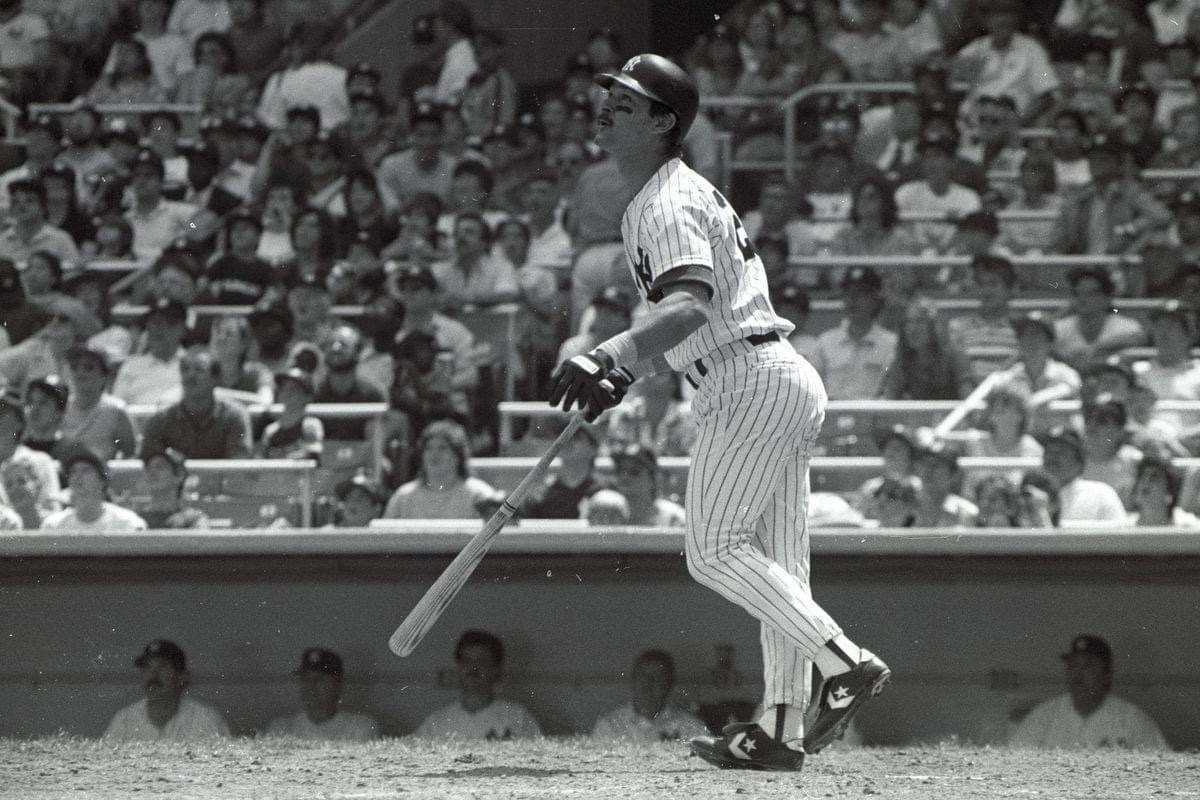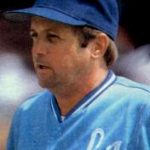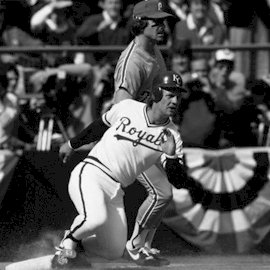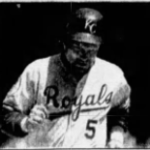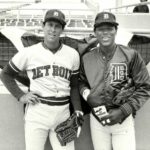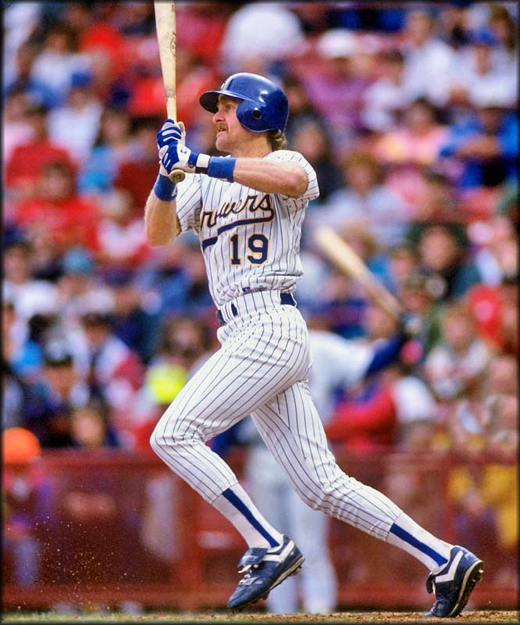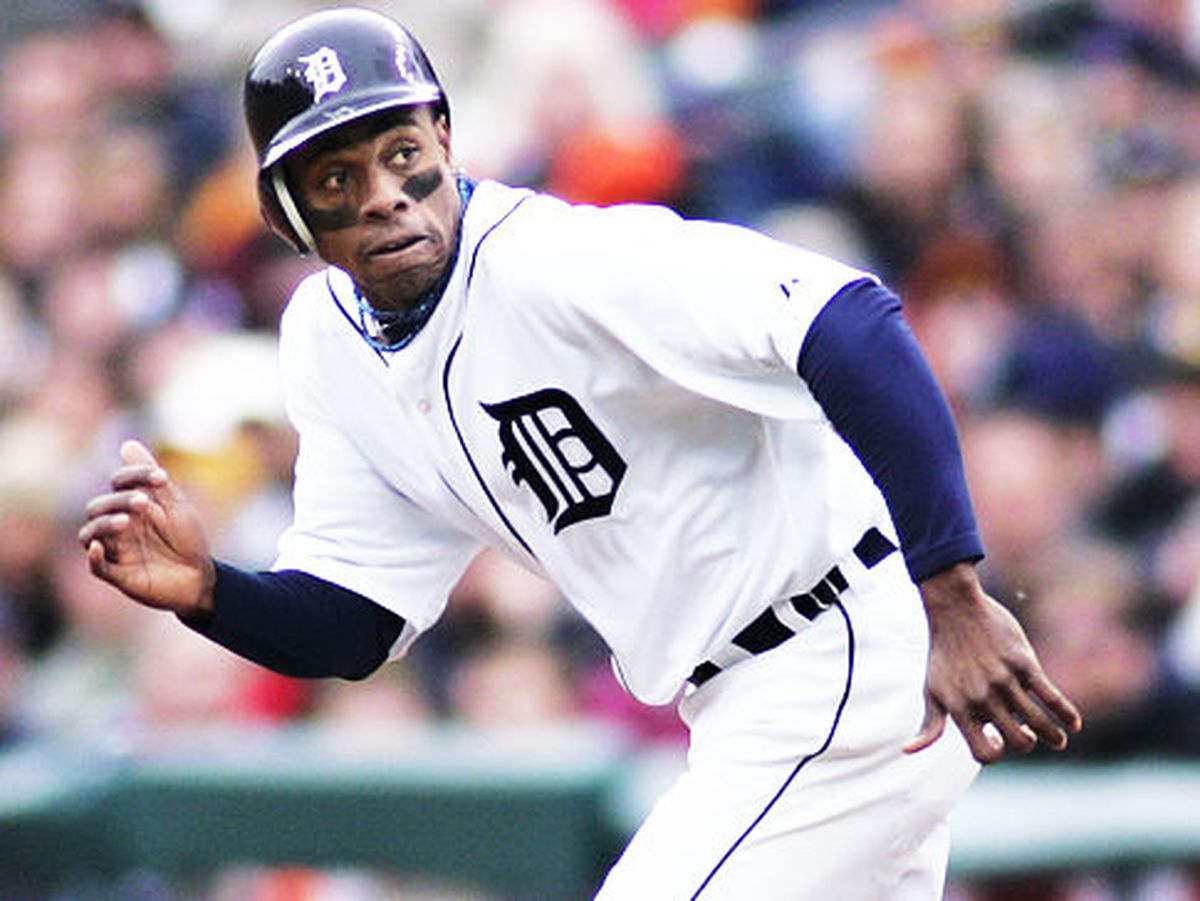George Brett
Positions: Third Baseman and First Baseman
Bats: Left • Throws: Right
6-0, 185lb (183cm, 83kg)
Born: May 15, 1953 in Glen Dale, WV
High School: El Segundo HS (El Segundo, CA)
Debut: August 2, 1973 (13,409th in major league history)
vs. CHW 4 AB, 1 H, 0 HR, 0 RBI, 0 SB
Last Game: October 3, 1993
vs. TEX 4 AB, 1 H, 0 HR, 0 RBI, 0 SB
Hall of Fame: Inducted as Player in 1999. (Voted by BBWAA on 488/497 ballots)
View George Brett’s Page at the Baseball Hall of Fame (plaque, photos, videos).
Agents: Dennis Gilbert
Full Name: George Howard Brett
Nicknames: Mullet
Twitter: @GeorgeHBrett
View Player Info from the B-R Bullpen
View Player Bio from the SABR BioProject
Relatives: Brother of Ken Brett
Nine Players Who Debuted in 1973
Dave Winfield
George Brett
Dave Parker
Brian Downing
Frank White
Bill Madlock
Frank Tanana
Steve Rogers
Randy Jones
All-Time Teammate Team
C: Darrell Porter
1B: John Mayberry
2B: Frank White
3B: Kevin Seitzer
SS: Freddie Patek
LF: Willie Wilson
CF: Amos Otis
RF: Kirk Gibson
DH: Hal McRae
SP: Larry Gura
SP: Dennis Leonard
SP: Bret Saberhagen
SP: Danny Jackson
SP: Mark Gubicza
RP: Dan Quisenberry
RP: Al Hrabosky
M: Whitey Herzog
Notable Events and Chronology for George Brett Career
The only man ever to win a batting title in three different decades, George Brett was among baseball’s elite hitters for virtually his entire career. In fact, a strong argument could be made that Brett was the greatest hitting third baseman of all time. He didn’t have as much power as either Mike Schmidt or Eddie Mathews, and he didn’t hit for quite as high a batting average as Wade Boggs. Nevertheless, Brett combined hitting for both power and average better than any other third sacker in baseball history. He hit 317 home runs during his career, accumulated 137 triples, and knocked in 1,595 runs – tying him with Schmidt for the most runs batted in by a third baseman. Brett also compiled a .305 career batting average, and his 665 doubles, 3,154 hits, and 1,583 runs scored are all records for third basemen. Brett’s .390 batting average in 1980 still stands as the highest mark posted over the course of an entire season by any player since Ted Williams hit .406 for the Red Sox in 1941 (Tony Gwynn batted .394 for San Diego during the strike-shortened 1994 campaign). And Brett was a tremendous clutch performer throughout his career, compiling a lifetime .337 batting average in postseason play, with 10 home runs and 23 RBIs in 166 at-bats.
Biography:
Born in Glen Dale, West Virginia on May 15, 1953, George Howard Brett was part of a big baseball family that also included older brothers Ken, John, and Bobby. Ken spent 13 years in the major leagues pitching for several different teams, while John and Bobby both played briefly in the minor leagues. The Brett family moved to the Midwest when George was still a young boy, but they eventually settled in the Los Angeles suburb of El Segundo. After graduating from El Segundo High School in 1971, George was selected by the Kansas City Royals in the second round of that year’s amateur free-agent draft with the 29th overall pick.
Brett began his professional career at shortstop, but he had difficulty fielding balls hit to his right, prompting a shift to third base shortly thereafter. He spent the better part of three years in the minors before finally being called up by Kansas City in August of 1973. The 20-year-old third baseman experienced little in the way of success in his 40 plate appearances, compiling a batting average of only .125.
Brett continued to struggle at the plate during the early stages of the 1974 campaign after winning the starting third base job in spring training. However, he worked feverishly with Kansas City hitting instructor Charlie Lau during the All-Star break to correct some errors in his swing that opposing pitchers had been exploiting. Lau taught the lefthanded-hitting Brett to be more selective at the plate, to wait longer on the pitcher’s offering, and to hit the ball to all fields, on all types of pitches. Heeding his instructor’s advice, Brett finished the season with a very respectable .282 batting average, although he hit only two home runs and knocked in just 47 runs.
Brett’s development as a hitter continued the following year, when he batted .308 and increased his offensive production by hitting 11 home runs and driving in 89 runs. The third baseman also led the American League with 13 triples and 195 hits. It was in 1976, though, that Brett became a star. He led the Royals to the A.L. West title for the first of three consecutive times by capturing the batting title with a mark of .333. Brett also scored 94 runs, stole 21 bases, and led the league with 14 triples and 215 hits, en route to earning the first of 13 straight All-Star Game nominations and finishing second in the league MVP balloting. Although Kansas City lost to New York in the ALCS for the first of three consecutive times, Brett gave an early indication as to the type of clutch performer he would end up being throughout his career, batting .444 and tying up Game Five with a three-run homer in the top of the eighth inning. However, the Yankees eventually prevailed, winning the pennant on Chris Chambliss’ leadoff homer in the bottom of the ninth inning.
Brett performed extremely well for the Royals in each of the next two seasons, helping them advance to the playoffs each year. He batted .312 in 1977, scored 105 runs, and increased his power numbers to 22 home runs and 88 runs batted in. Injuries limited the Kansas City third baseman to 128 games the following year, but he still managed to hit .294, steal a career-high 23 bases, and lead the league with 45 doubles.
Although the Royals failed to advance to the postseason in 1979, Brett had one of his finest seasons. In addition to batting .329, hitting 23 home runs, driving in 107 runs, scoring 119 others, and compiling 42 doubles, he led the league with 20 triples and 212 hits. By surpassing 20 homers, 20 triples, and 20 doubles, he became only the sixth player in major league history to top the 20-mark in each category in the same season. Brett finished third in the league MVP voting.
The Pine Tar Game
The 1980 season was a magical one for Brett. Although various physical ailments forced him to sit out 45 of his team’s games, Brett flirted with the .400-mark for much of the season, at one point compiling a 30-game hitting streak. He finished the year with a .390 batting average, and he also established new career highs with 24 home runs and 118 runs batted in, while leading the league with a .454 on-base percentage and a .664 slugging percentage. The Royals captured their fourth A.L. West title in five years, and Brett was named league MVP in overwhelming fashion. The Royals then faced the Yankees again in the ALCS, but they came out on top this time, sweeping their old nemesis in three straight games. Brett delivered the decisive blow, hitting a three-run upper-deck homer off Yankee relief ace Goose Gossage in the top of the seventh inning of Game Three to provide the margin of victory. The Kansas City third baseman revealed the “team-first” mentality he carried with him throughout his career when he stated after the contest, “I know I captured a lot of the media’s attention this past season, but the Royals have a team built on teamwork, not on individuals.” Kansas City subsequently lost the World Series to the Phillies in six games, but Brett could hardly be faulted. He batted .375 during the Fall Classic, with one home run and three runs batted in.
Numerous injuries caused Brett to miss significant playing time in three of the next four seasons. Still, he remained one of the American League’s best hitters whenever he was in the lineup, batting over .300 three times, topping 20 homers twice, and leading the league with a .563 slugging percentage in 1983. The Royals advanced to the postseason twice during that period, but they were quickly eliminated in three games each time, leaving the extremely competitive Brett to wonder if he was ever going to win the world championship he so desperately craved. Longtime teammate Jamie Quirk spoke of Brett’s competitive drive when he said, “If you’ve ever played golf with him, you’d know he’s so competitive that he can’t stand to lose. He can’t sit down and play a card game that he doesn’t want to beat you. That’s the way he played baseball. If he had to, he’d take it in his own hands and win the ballgame.”
Brett’s dream of winning a championship was finally fulfilled in 1985, a season that was among the very best of his career. In addition to hitting a career high 30 home runs,
Brett knocked in 112 runs, scored 108 others, batted .335, and led the league with a .585 slugging percentage. He finished the regular season in style, hitting five home runs and driving in nine runs in Kansas City’s final six games, to enable his team to sneak into the playoffs. The third baseman also improved his defense, which was somewhat suspect earlier in his career. By committing only 15 errors in the field (easily his lowest total in any full season at third base), Brett earned his only Gold Glove Award. Brett’s exceptional all-around performance led the Royals to the division title even though they lacked another big bat in their lineup. He finished second to New York’s Don Mattingly in the league MVP voting. Brett then led his team past the favored Toronto Blue Jays in the ALCS by batting .348, hitting three home runs, and driving in five runs, despite receiving a total of seven walks from Toronto pitching. The Royals then overcame a three-games-to-one deficit against St. Louis in the World Series to capture their only world championship. Brett batted .370 during the Series.
Brett’s extraordinary performance during the 1985 postseason was really nothing unusual for him. Perhaps the greatest clutch hitter of his generation, Brett established LCS records with nine home runs and a .728 slugging average over the course of his career. Those are the numbers that prompted longtime teammate John Wathan to say, “When the game was on the line, we all wanted George at the plate.”
Second baseman Frank White, who spent his entire career playing with Brett, stated, “Any time you can play with a Hall of Famer, then it is something special to remember. I’ve seen great players make great plays many times. But he was the greatest clutch hitter I’ve played with or against.”
Sparky Anderson managed Cincinnati to four National League pennants and two world championships before piloting the Detroit Tigers to the A.L. flag and World Series title in 1984. Speaking of Brett, the Hall of Fame manager noted, “I’ve always loved the way he played the game of baseball, and I also thought he was the most dangerous hitter I ever faced – certainly in the American League. Back with Cincinnati, I used to walk the Giants’ Willie McCovey all the time because he could just kill you. I thought I’d never treat another hitter that way, but I wound up doing it with George.”
The 1985 World Series turned out to be Brett’s last postseason appearance. The Royals failed to advance to the playoffs in any of his eight remaining years with the team, as Brett continued to battle numerous injuries. He eventually moved across the diamond to play first base in 1988, and serving in that capacity seemed to help Brett, who hit 24 homers, knocked in 103 runs, and batted .306. Brett had his last big year in 1990, winning his third batting title with a mark of .329 and leading the league with 45 doubles.
Brett spent most of the next three seasons as Kansas City’s designated hitter, reaching the 3,000 hit plateau late in the 1992 campaign. He retired at the conclusion of the following year as Kansas City’s all-time leader in every major statistical category except stolen bases.
Over the course of his career, Brett batted over .300 on 11 separate occasions, hit more than 20 homers eight times, surpassed 100 runs batted in and 100 runs scored four times each, topped 200 hits twice, and accumulated as many as 40 doubles five times. In addition to leading the league in batting average three times, Brett topped the circuit in hits, triples, and slugging percentage three times each, in doubles twice, and in on-base percentage once. He finished in the top three of the league MVP balloting four times during his career.
Perhaps Bob Costas summed up George Brett best when he said, “He (Brett) was
clearly one of the best players of his generation, but he had a style that spanned the generations. He looked and carried himself like a baseball player and could have been at home in any era. He was the kind of guy who conveyed something to fans that’s very important, which was that he thought of himself first and foremost as a baseball player. There was nothing in the world that he would rather be doing than playing baseball every day when he was on the field.”
@ET-DC@eyJkeW5hbWljIjp0cnVlLCJjb250ZW50IjoicG9zdF90YWdzIiwic2V0dGluZ3MiOnsiYmVmb3JlIjoiTGVhcm4gTW9yZSBhYm91dCB0aGUgdGVhbXMsIHBsYXllcnMsIGJhbGwgcGFya3MgYW5kIGV2ZW50cyB0aGF0IGhhcHBlbmVkIG9uIHRoaXMgZGF0ZSBpbiBoaXN0b3J5IC0gLSAtIC0gLSAtIC0gIiwiYWZ0ZXIiOiIiLCJsaW5rX3RvX3Rlcm1fcGFnZSI6Im9uIiwic2VwYXJhdG9yIjoiIHwgIiwiY2F0ZWdvcnlfdHlwZSI6InBvc3RfdGFnIn19@
Factoids, Quotes, Milestones and Odd Facts
Line-drive hitting George Brett was “The Franchise” for the Kansas City Royals during most of their first twenty-five years of existence. A line-drive hitting menace, he seriously challenged the coveted .400 batting mark in 1980, and collected more than 3,000 hits in his career. He was one of the greatest post-season performers in baseball history and the first Royal inducted into the Hall of Fame
Played For
Kansas City Royals (1973-1993)
Similar: None
Linked: Hal McRae, Frank White, Goose Gossage, Wade Boggs (who named his oldest son after Brett).
Best Season, 1980
Brett won the AL MVP and the Sporting News Player of the Year Award for his 1980 season. His assault on a treasured baseball standard (the .400 mark) also vaulted him into the status as the game’s best and most feared hitter and a future Hall of Famer. He also became one of the few batters to ever drive in more runs (118) than games played (117). Brett led the league in batting, slugging, OBP, OPS and Total Average in 1980, the last player to do so in the AL.
Awards and Honors
1980 AL MVP
1985 AL ALCS MVP
1985 AL Gold Glove
Post-Season Appearances
1976 American League Championship Series
1977 American League Championship Series
1978 American League Championship Series
1980 American League Championship Series
1980 World Series
1981 American League Division Playoffs
1984 American League Championship Series
1985 American League Championship Series
1985 World Series
Factoid
After George Brett lined a single for his 3,000th career hit, he was picked off first base by Angels’ pitcher Tim Fortugno
When asked later in his career about the Hall of Fame, George Brett was humble, often joking that he wouldn’t make it. How wrong he was. On January 4, 1999, the election results were made public. Brett had garnered 488 votes out of a possible 497. His 98% vote total was fourth best in the history of baseball. Only Tom Seaver, Nolan Ryan (also elected in 1999), and Ty Cobb had received a larger percentage.
“When I was told that I got in and got 98 percent, I was just flabbergasted. It just knocked me on the floor. You think it was the Christmas cards my wife sent out to the voters?” Brett joked at a news conference.
“Like somebody wrote the other day, this is the biggest phone call in a player’s life,” he said. “You get awards and play in front of a lot of people, then for five years you don’t do anything. Now, all of a sudden, to be remembered for something that you didn’t do yesterday or last week or last month but for the culmination of a 20-year period that ended five years ago, for people to remember you for what you accomplished on the field is a tremendous feeling.”
Where He Played: Third Base (1,692 games), DH (506 games), first base (461 games), outfield (36 games), shortstop (11 games)
Big League Debut: August 2, 1973
It was August 2, 1973, less than five years after their conception, the Royals had already established themselves as more than just another expansion team. Kansas City had finished no lower than fourth in the 6-team American League West division and boasted a second place finish in 1971. The roster was brimming with young talent in late 1973. Some would later form the backbone of the successful Royal teams of the 70’s. John Mayberry, Amos Otis, Hal McRae, Freddie Patek, Paul Splittorff, Doug Bird, and Steve Mingori were among this group. Also on this team where Lou Piniella, Steve Busby, and Al Fitzmorris who had already proved valuable but would leave in the ensuing years. Manager Jack McKeon was in his first season with the team and had led them to a fine first half that saw them battling the World Champion Oakland A’s for first place. Veteran Stan Bahnsen started the game for the White Sox, opposing Dick Drago. Otis singled in a run in the first and later scored to provide most of the offense for Kansas City. Rookie third baseman George Brett lined out to Bahnsen in his first major league at-bat but later collected his first hit off Bahnsen, a single. He also started a double play at third base in the Royals 3-1 victory, their fifth straight. Fittingly the win vaulted the team one game ahead of the A’s in the West Division race. At the time Brett was the youngest player to ever wear a Royal uniform. On that day in baseball Nolan Ryan fanned 11 Ranger batters, giving him 250 for the season, it was his first win since a no-hitter on July 15. Years later Ryan and Brett would help form the Hall of Fame class of 1999. Also on the day Brett debuted, Cleon Jones collected his 1,000 major league hit, the first Met to do so.
Post-Season Notes
Entering 1985, the Kansas City Royals had won the AL West crown five times. Four times they had lost in the playoffs – three times to the hated New York Yankees. Only once had they advanced to the Fall Classic – suffering a disappointing loss in 1980 to Pete Rose, Mike Schmidt, and the Philadelphia Phillies. After again winning the AL West in 1985, thanks to a great stretch drive from their superstar George Brett, the Royals would face the Toronto Blue Jays in the ALCS. In Game One Dave Stieb tamed the Royals 6-1 despite Brett’s three hits. In Game Two lefty Jimmy Key prevailed 2-1 as it seemed the Blue Jays would dispatch of the AL West champs easily.
But in Game Three, Brett asserted himself; he practically willed the Royals to win. The series moved to Kansas City, and George promptly collected four hits, including a double [that hit two feet from the top of the wall] and two homers. He drove in 3 runs and scored four times himself. The Royals won 6-5 and Brett even flashed his glove in the third inning when he backhanded Lloyd Moseby’s sharp grounder and threw out Damaso Garcia at the plate. It was one of the best post-season single game performances in baseball history. Thanks to Brett, the Royals were still in it.
“That was the best game I played in my life,” Brett would later say.
KC lost the next day to fall behind 3-1, but they won Game Five 2-0 to survive. Back in Toronto Brett led them again, hitting a homer and scoring two runs as KC won 5-3 to knot the series at 3-3. In Game Seven he went hitless, but his heroics weren’t needed as Bret Saberhagen outdueled Stieb for a 6-2 win.
The Royals had came back from the brink to earn their second AL Title. This time they would face an old friend in the Series. Whitey Herzog had his St. Louis Cardinals in the Fall Classic and it would prove to be quite a classic indeed.
Kansas City found themselves in familiar territory on October 23rd. They were down 3-1 in games to the Cardinals. Though each loss had been close, the Royals were given little chance to rebound against the faster, more powerful, Cardinal team. Game Five saw the Royals prevail 6-1 in St. Louis in a game where Brett dove recklessly into the Royal dugout in an attempt to catch Terry Pendleton’s popup. His hustle inspired his teammates.
The series returned to Kansas City where the home team was confident in front of their fans. Game Six would feature a classic comeback stemming from a controversial call.
Down by a run in the ninth with two outs, KC’s Jorge Orta bounced a grounder to the infield, the throw beat him by a half step but umpire Don Denkinger called Orta safe and a few batters later the Royals had pushed two runners across to win in dramatic fashion. Herzog and his Cards felt robbed, but they would have one more chance to take the crown. But in one of World Series history’s most lopsided wins, KC romped 11-0 in Game Seven for their first title. Brett slashed four hits and stole a base in the game.
The victory was extra sweet because it came at home in front of the KC faithful who had waited 17 seasons for the championship. In the middle of the celebration was Brett, who called it his proudest moment in baseball. His numbers for the series: 10 hits, 5 runs, and a .370 average.
Feats: Won three batting titles, each in a different decade: 1976, 1980 and 1990… Collected three or more hits in six consecutive games (May 8-13) 1976, setting a major league record… Collected 20 doubles, triples and homers in 1979, becoming the sixth player to do so… Hit three homers on July 22, 1979, and April 20, 1983… Hit three homers in ALCS game, on October 6, 1978, vs. the Yankees… Hit for the cycle twice: on May 28, 1979 and July 25, 1990… Only player besides Ty Cobb to lead his league in hits and triples three times… Hit grand slams in 1980, 1984.
Milestones
Brett collected his 3,000th hit on September 30, 1992, in Anaheim off Tim Fortugno. He became the first player to get four hits in the game in which he reached 3,000. George’s brother, Ken, was in the Angels’ broadcast booth working the game.
Notes
Brett hit .292 (7-for-24) with two doubles, one triple, one homer and five RBI in 10 All-Star games. In 1980 he was voted as a starter but did not play due to injury, and in 1987 he was a reserve but was injured… Brett hit .692 (18-for-26) from May 8-13, 1976, when he set a ML record with three or more hits in six straight games… Brett played long enough that he was actually managed by two ex-teammates: John Wathan, and Hal McRae – the man he had narrowly defeated to win the 1976 American League batting title.
Injuries and Explanation for Missed Playing Time
From 1975 to 1990, the first sixteen seasons in which George Brett was a regular, he missed about 15% of his team’s games due to injuries. This inability to stay healthy cost him approximately 400 base hits.
- 1977-knee sprain, missed two weeks.
- 1978-chipped bone in right thumb, finished season on bench, missed about a month. 34 games total missed due to thumb and shoulder injuries.
- 1979-had surgery on right thumb, missed spring training.
- 1981-missed two weeks of strike-shortened season due to recurring wrist trouble.
- 1982-missed two weeks in mid-August with sore wrist.
- 1983-was on disabled list twice with sore left knee, missed action throughout the season. Went on the disabled list for 19 games in June with a broken toe suffered while striking a door jam when rushing to watch Bill Buckner on TV.
- 1984-had surgery on left knee in off-season, resulted in missing the first 33 games of the schedule. Pulled left hamstring on Aug. 20 at Boston when he went from a home run trot to an all-out sprint after hitting a ball off the top of the Green Monster. Missed 23 games, came back to finish season and playoffs.
- 1986-sat out frequently during the season due to a shoulder strain.
- 1987-shoulder problem and other minor injuries forced him to miss over a month. On June 26th he switched from third base to first due in most part to the injuries. Kevin Seitzer took over at the hot corner.
- 1989-tore his medial collateral ligament on April 29, placed on DL and missed 35 games.
- 1991-was sat for the first time in his career due to poor production, was rested primarily against left-handed pitching.
1980-on disabled list with right heel sprain, wrist sprain and swollen hand, missed five weeks of action during regular season. In World Series he suffered from hemorrhoids but did not miss a game.
Family Tree
His brother Ken pitched in the majors for 14 seasons, winning 83 games. George and Ken were teammates on the Royals in 1980 and 1981.
Hitting Streaks
30 games (1980)
25 games (1982)
Transactions
Selected by the Kansas City Royals in the 2nd round of the free-agent draft, June 8, 1971.
Data courtesy of Restrosheet.org
The Royals/Yankees Rivalry
George Brett had no love for the New York Yankees.
“The Royals and the Yankees hated each other. To this day, whenever I see Lou Piniella or one of those Yankees, we talk about how I hated those guys. It was the way baseball was meant to be played. They were hard-fought games, very, very physical. I can remember Hal McRae knocking Willie Randolph into left field, breaking up a double play, and just laying on him and waving Willie Wilson in from third base.”
Or there was the time that Piniella slid into Brett at third.
“I didn’t even have the ball, and he tried to spike me,” Brett said.
Whenever and wherever they played, the gritty rivalry endured. In the 1978 AL Playoffs, Brett hit a triple and crashed into Yankees third baseman Graig Nettles. “I came up and gave him an elbow, and he stepped back and kicked me in the face,” Brett said.
“We came to blows right there, but that was the kind of rivalry we had. Unfortunately, we didn’t win many of the games.” Three straight playoff losses to the Yankees, 1976-1978, were especially frustrating. “In 1980, finally winning, for us it was like winning the World Series,” Brett said.
It was Yankee Thurman Munson, though, who was a hero to Brett in that ’78 fight with Nettles in KC. “Craig and I are throwing haymakers at each other, and the next thing I know I’m on the bottom,” Brett recalled. “And Thurman is lying on top of me with his catching gear on and saying, `Don’t worry, George. I won’t let anybody hit you when you’re down.’ And they didn’t.”
The 1985 American League West Race
To put it simply: the Royals and George Brett had been stung by the post-season too often. On three successive occasions they had fallen in the playoffs to the hated New York Yankees, twice in series-deciding fifth game. In 1980 they ruled the AL behind Brett’s hot bat but were vanquished by the Phillies in the World Series four games to two. Then in 1984 they were swept in the playoffs by a powerful Detroit team. By 1985 some Royal fans may have thought that a world title was never to be. The season that unfolded proved that assumption false however, and Brett had as much to do with it as anyone.
The Royals were the defending Western Division champs heading into ’85. Yet few gave them much chance against the Angels, Twins, and White Sox. Brett started hitting in May and put together a great spring and summer, peaking at .359 on July 21st. The Royals chased the Angels all summer behind Brett, veterans Frank White, Hal McRae, Willie Wilson and Dan Quisenberry, and young pitching ace Bret Saberhagen. The Angels enjoyed the lead for nearly the entire season, and seemed poised to lock it up before slumping in late August and September.
The final two weeks of September saw the two division rivals tied 7 times for the lead. The Royals were never able to gain the lead themselves however. On September 30th the Royals hosted the Angels in the first of four games in Kansas City. The Angels came in leading by a game, led by veterans Rod Carew, Reggie Jackson, Bobby Grich, and Bob Boone, with Don Sutton, Mike Witt, and Donnie Moore pacing the pitching staff. The game of the 30th pitted Saberhagen against lefty John Candelaria. The young Royal had command the whole way and tamed the Angels 3-1 on five hits, striking out 10. Brett tied the game in fourth with a solo homer, his 26th – a career high to that point. Later, in the sixth he had a ball caught at the wall but it didn’t matter. Kansas City had tied the race.
“If we’d lost,” Brett said, “we would be two down with six to play. Tonight was probably the most important game of the year. Tomorrow’s game will be the most important too, and so will Wednesday’s”
The next night the Angels lashed back and grabbed the lead with a 4-2 win. Witt took a shutout into the eighth before KC tallied two runs to slice the lead in half, 4-2. Brett singled and drove Wilson home in that inning, but Moore slammed the door shut and preserved the win in the ninth. Unfortunately for Brett, his throwing error led to an Angel score in the game, but he would atone for it later in the series.
The next night the Royals opened up early on the Angels. Lonnie Smith blooped a single, Wilson reached on a pitch that Angel starter Ron Romanick threw up and in – nicking the speedster. Brett followed with a sinking liner off the end of his bat that drifted near the foul line in right. Outfielder Juan Beniquez tried to make a diving catch rather than cut off the ball, but it bounced under his glove and rolled to the wall. Gary Pettis arrived from center to field the ball, but his relay to the plate was late as Brett slid safely under the tag of Boone. For Brett, it was a sprint around the bases for an inside-the-park home run. For the Royals it was a first-inning 3-run lead. Bud Black shut down the visiting Angels on three singles, and the Royals won 4-0. The race was again deadlocked.
The final game of the four-game series saw the Royals use the long ball to tame the Angels and grab the division lead. Again, Brett was in the middle of things. After drawing a two-out first inning walk, White planted a Don Sutton pitch into the fountain in center, putting the home team up 2-0. Steve Balboni homered in the fourth and in the fifth Brett hit a solo shot to close the KC scoring. It was his third circuit clout of the crucial series. The Royals would go into their final weekend series at home against the A’s leading by 1 over the stunned Angels.
“To dominate the whole season and see it come down to the end is pretty tough to swallow,” California infielder Doug DeCinces said. “But the season is not over. I’ve seen crazier things happen.”
On Friday, October 4th, the Angels found themselves in Texas while KC entertained Oakland. The Rangers played spoiler, taming the faltering Angels 6-0 while the Royals got a clutch performance from starter Mark Gubicza. Brett again homered and again it was of the inside-the-park variety. This time it was a solo homer in the 7th that increased the KC lead to 4-2, the game’s final score. Ace reliever Dan Quisenberry pitched the last 2 2/3 innings for his 37th save and the Royals clinched at least a tie. It left them a step closer to another trip to the post-season.
“If that happens,” Brett said, “you’re gonna see a lot of celebrating. If they win, then we have to come out here and win too. If they lose, it doesn’t matter.”
Brett made a critical defensive play in the 9th, backhanding a Dave Kingman bouncer near the line, then throwing the ponderous slugger out. The play was the second out of the game and it kept a baserunner at second base. But the Royals leader was more concerned with his bat, which was heating up for a possible post-season return.
“When you have a September like I had you’d be happy going 1 for 4 every day. But when I got to the ballpark Monday I was physically and mentally ready to play. I could feel it in batting practice.”
Asked about his second inside-the-park home run in three days, Brett said, “I’d like it the other way better. It’s less exciting for the crowd but not as much work.”
The following night the Angels beat Texas 3-1, putting the pressure on KC. It looked as if the race may tighten as Oakland posted a 4-0 lead on the Royals after five and a half innings. Saberhagen lasted just 4 innings but the KC pen staved off the A’s, allowing for a dramatic charge by the offense. In the bottom of the sixth Brett belted his fifth homer of the week and 30th of the season with a man on base to chase A’s starter Tim Birtsas and close the gap, 4-2. In the seventh the Angels avoided Brett with first base open, walking him and setting up Frank White’s RBI single. Balboni followed with a single that scored Brett with the tying run. Quisenberry did his job over the last three innings and the home team won it in the 10th. Willie Wilson singled up the middle to score Pat Sheridan and the franchise had it’s sixth AL West crown in ten years.
Brett had nearly been a one-man wrecking crew: going 9-for-20 [.450] with seven runs, five homers, and nine RBI in the critical six games, five of them victories. He set a major league regular season record by hitting four homers in October. He was involved in nearly every scoring rally the team had during the stretch. The victory was sweet. Royals fans and players sensed that this time the post-season may finally end happily for the franchise.
All-Star Selections
1976 AL
1977 AL
1978 AL
1979 AL
1980 AL
1981 AL
1982 AL
1983 AL
1984 AL
1985 AL
1986 AL
1988 AL
Replaced
Paul Schaal, the Royals third baseman in 1973, who was shipped to the Mets.
Replaced By
Bob Hamelin became the Royals’ full-time DH in 1994.
Best Strength as a Player
Clutch performance.
Largest Weakness as a Player
Injuries in the middle of his career.
Other Resources & Links
Coming Soon
If you would like to add a link or add information for player pages, please contact us here.

